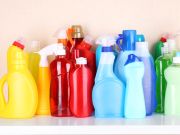WEDNESDAY, March 18, 2020 (HealthDay News) — A number of home cleaning supplies may be effective against the new coronavirus, experts say.
“Not many scientific studies have asked which are the most effective disinfecting agents to use against [the new coronavirus] because it was discovered so recently,” said Siobain Duffy, an associate professor of ecology at Rutgers University in New Brunswick, N.J., with expertise in emerging viruses. “So scientists are assuming that what works against other coronaviruses can work against this one.”
But each disinfecting chemical has specific instructions, another expert in microbial risk assessment pointed out.
“An important general rule is that you shouldn’t immediately wipe a cleaning solution off as soon as you’ve applied it to a surface. Let it sit there long enough to kill viruses first,” Donald Schaffner said in a university news release. He’s a professor and food microbiologist at Rutgers.
The U.S. Centers for Disease Control and Prevention recommends daily disinfection of often-touched surfaces such as tables, doorknobs, light switches, countertops, handles, desks, phones, keyboards, toilets, faucets and sinks, as well as the use of detergent or soap and water on dirty surfaces prior to disinfection.
If someone in your household has flu-like symptoms, consider regularly disinfecting objects in your home, since the new coronavirus has been shown to survive for 16 hours on plastics.
Never use different cleaning agents at the same time. Some household chemicals, if mixed, can create dangerous and poisonous gases.
If you use bleach, use one-quarter cup of bleach per 1 gallon of cold water, but be sure to follow directions on the product label. Make the diluted bleach solution as needed and use within 24 hours, as its disinfecting power fades with time, Duffy and Schaffner said.
Nonporous items like plastic toys can be dipped in bleach for 30 seconds. Household surfaces that won’t be damaged by bleach should get 10 or more minutes of exposure.
Bleach solutions are hard on the skin, so don’t use them as a substitute for hand-washing and/or hand sanitizer.
Many forms of alcohol, including rubbing alcohol, can kill germs. You can dilute alcohol with water (or aloe vera to make hand sanitizer) but be sure to keep an alcohol concentration of around 70% to kill coronaviruses, Duffy and Schaffner said.
Solutions of 70% alcohol should be left on surfaces for 30 seconds (including cellphones) to ensure they will kill viruses. Pure (100%) alcohol evaporates too quickly for such use.
Unlike bleach solutions, alcohol solutions will remain potent as long as they’re kept sealed between uses. But a 70% alcohol solution with water is harsh on the hands and shouldn’t be used as a substitute for hand-washing and/or hand sanitizer, Duffy and Schaffner said.
Hydrogen peroxide is typically sold in concentrations of about 3%. It can be used as is, or diluted to 0.5% concentration for effective use against coronaviruses on surfaces. It should be left on surfaces for one minute before wiping.
Natural chemicals such as vinegar and tea tree oil are not recommended for fighting coronaviruses.
More information
The U.S. Centers for Disease Control and Prevention has more on the coronavirus.
Copyright © 2026 HealthDay. All rights reserved.

